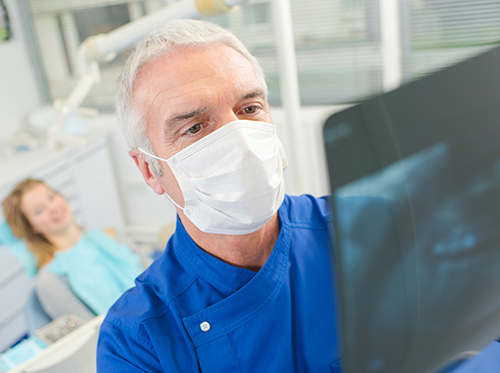September 12th, 2018

X-rays have been a function of dental healthcare for a long time. That in and of itself should be good news, because it means we've had plenty of time to improve them. While there is always some risk in exposure to radiation, dental X-ray exposure has decreased significantly due to all the advances in technology. So there’s risk, but X-rays are quite safe.
Think of X-rays as you would about a car. Automobiles these days have all kinds of technology to make them as safe as possible. There's still a chance that you’ll suffer an accident. Would you stop using a car because of that risk? When it comes to dental X-rays, Dr. Stephen Hudis and our team believe the positives clearly outweigh the negatives.
X-rays can be done digitally or with film. For film, X-rays require different exposures at different speeds to produce the image. Digital X-rays have software that automatically adjusts the exposure and produces the X-ray in a digital file. Since they substantially reduce your exposure to radiation, digital X-rays are the current standard in dental offices.
In addition to digital X-rays, lead aprons are an essential piece of X-ray safety. They help protect internal organs from X-rays by acting as a shield. They usually come with a thyroid collar as well, since that is one of the most vulnerable areas to X-rays in the body. Lead aprons can absorb up to 95% of any scatter rays that result from an X-ray. Not bad, right?
Although dental X-rays involve some radiation exposure (not all of it can be eliminated), so does everyday life. Getting too much sun, for example, can be dangerous. The truth is, we accumulate radiation in our bodies over a lifetime, so it’s worthwhile to be aware and avoid as much unnecessary exposure as possible. When it comes to your dental health, though, getting an X-ray — especially when your doctor says you need it — offers more benefits than risks.
Ask us about the type of dental X-rays we use during your next visit to our Princeton, NJ office!
September 5th, 2018

Guilt is a powerful feeling. It can keep you from doing many things, including going to the dentist. The good news is that Princeton Restorative & Implant Dentistry is a judgement-free zone, and coming back (even after an extended period of being MIA) can be easier than you think. Our goal is to make you as comfortable as possible during your first appointment back with us — so here’s a little overview of what you can expect.
We’ll start with a series of dental X-rays, which are usually taken every three to five years. The set of X-rays will depend on your individual needs and it will help us get a more thorough look at what’s going on with your dental structure and keep an eye out for any prominent dental issues.
Next up will be your hygiene appointment. That appointment will consist of a review of your medical history and be followed by a thorough cleaning of your teeth. This is the perfect time to share concerns you may have about your oral health and ask us questions.
You’ll finish up with a comprehensive exam, which will review everything you covered with the hygienist. Dr. Stephen Hudis will go over your medical history with you and address any dental concerns that might remain. If any special treatment is needed for such issues as cavities or broken fillings, we will discuss that with you as well.
Once all that is done, you’ll head over to the front desk to talk about payment and scheduling your next appointment. And that’s it! Your first visit back is an important step toward continuing to look out for your dental health.
Just because you slacked for a little while or life got in the way, this doesn’t mean things have to stay that way! We’re happy to help you get you back on track, so schedule an appointment at our Princeton, NJ office today!
September 5th, 2018

At our office, Dr. Stephen Hudis and our team do all that we can to make sure that your experience with us is the best it can possibly be. However, there’s an important role you play in this as well: leaving us reviews and feedback.
Whether there is something you’d like us to improve upon, or you’d just like to express your thanks for a job well done, your feedback is essential to our practice’s success.
We look forward to hearing from you, and are excited to hear what you thought of your most recent visit at our Princeton, NJ office.
August 29th, 2018

Many people are confused when it comes to which specialist they need to see about their dental needs. However, it is a simple decision depending on what your individual needs are. For example, a dentist performs routine cleanings and addresses all issues with filling cavities etc. Some of general dentists can also perform other procedures such as bridges and crowns, and some even refer to themselves as a cosmetic dentist.
Typically any dentist can refer to themselves as a “cosmetic dentist” however, a prosthodontist, like Dr. Stephen Hudis, is actually educated for an additional three years to know how to correctly perform cosmetic dentistry, bridges, dentures, crowns, and implants.
After successfully completing a four-year dental degree, those who choose to become a prosthodontist will have to attend an additional three years. During these three years they are educated extensively on everything that has to do with prosthetics involving the mouth. They will be able to perform all bridge work, crowns, implants, and dentures. They also will be able to successfully lead any other team of dentists you may be seeing to get you the best possible treatment.
A general dentist chooses not to specialize in any particular area. While they may be proficient at many dental procedures, they may still refer patients to our Princeton, NJ office for more complicated procedures, including:
- Treatment due to injuries
- Snoring disorders
- Cleft palate or related issues
- Joint problems such as TMJ
- Maxillofacial prosthetic procedures
- Full mouth reconstruction
- Cosmetic issues
If you have an issue that you are not sure who is best to treat, keep in mind that, although both are able to treat a multitude of issues, only prosthodontists receive the education and training to specialize in more serious issues.








